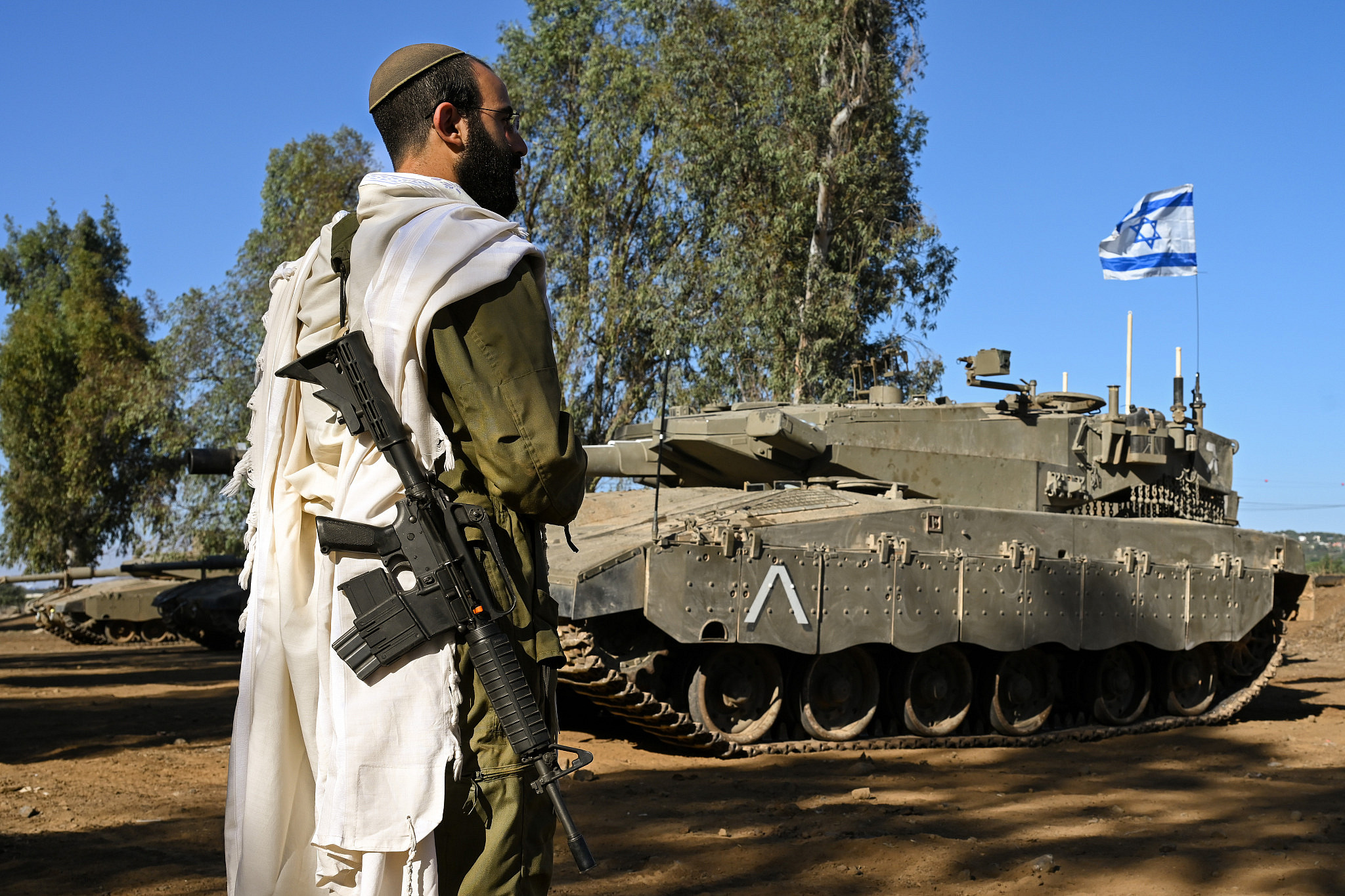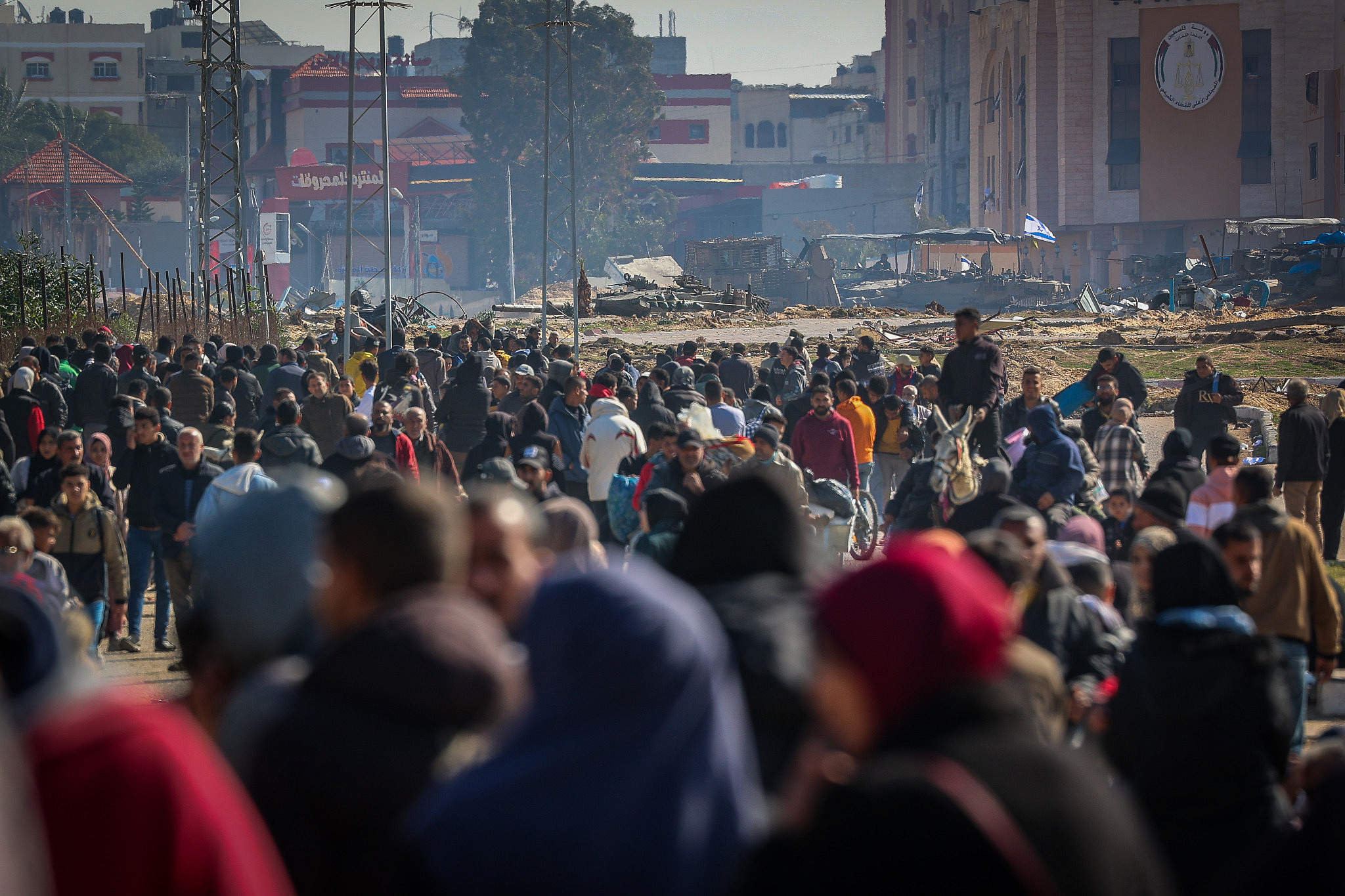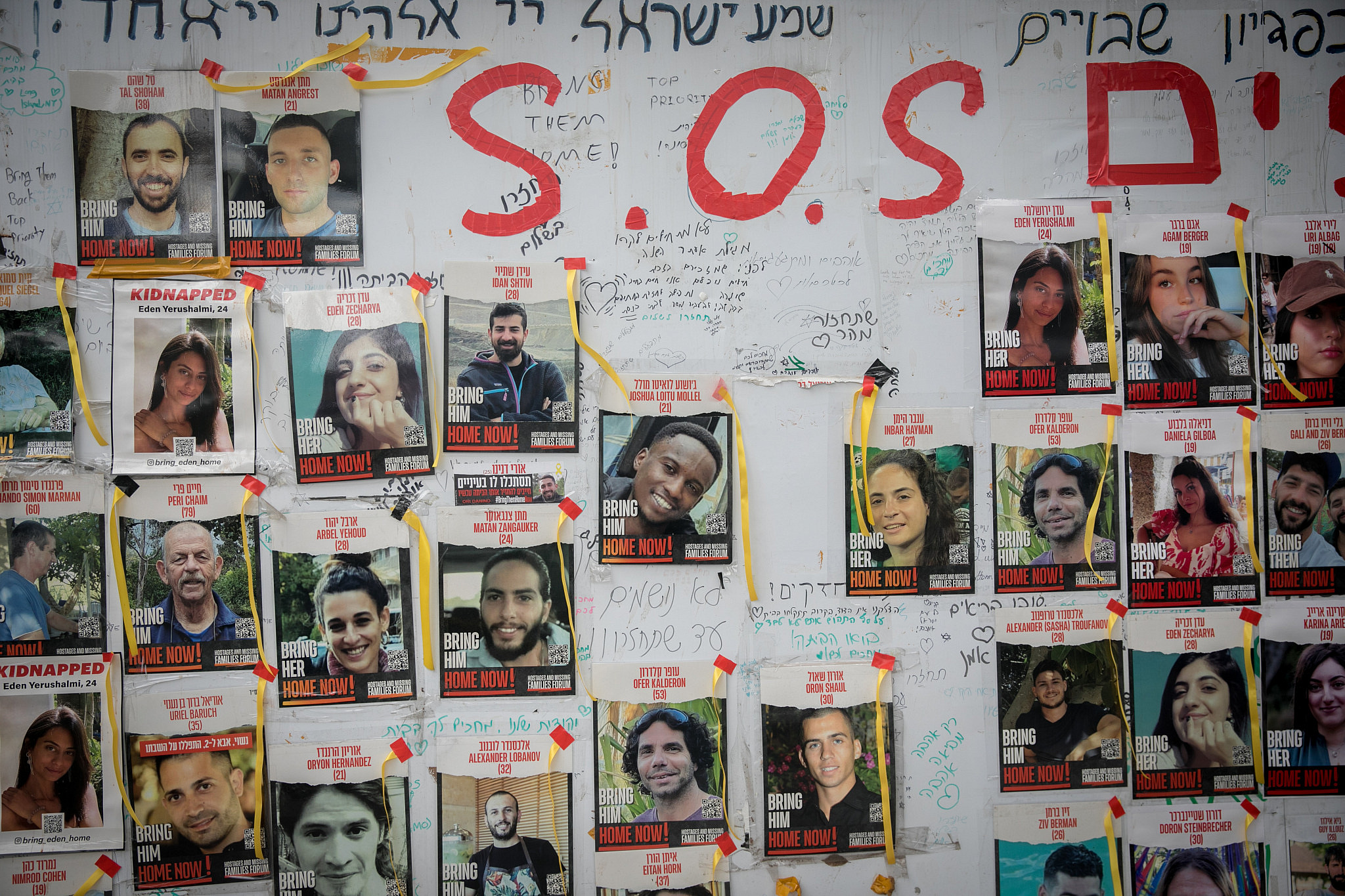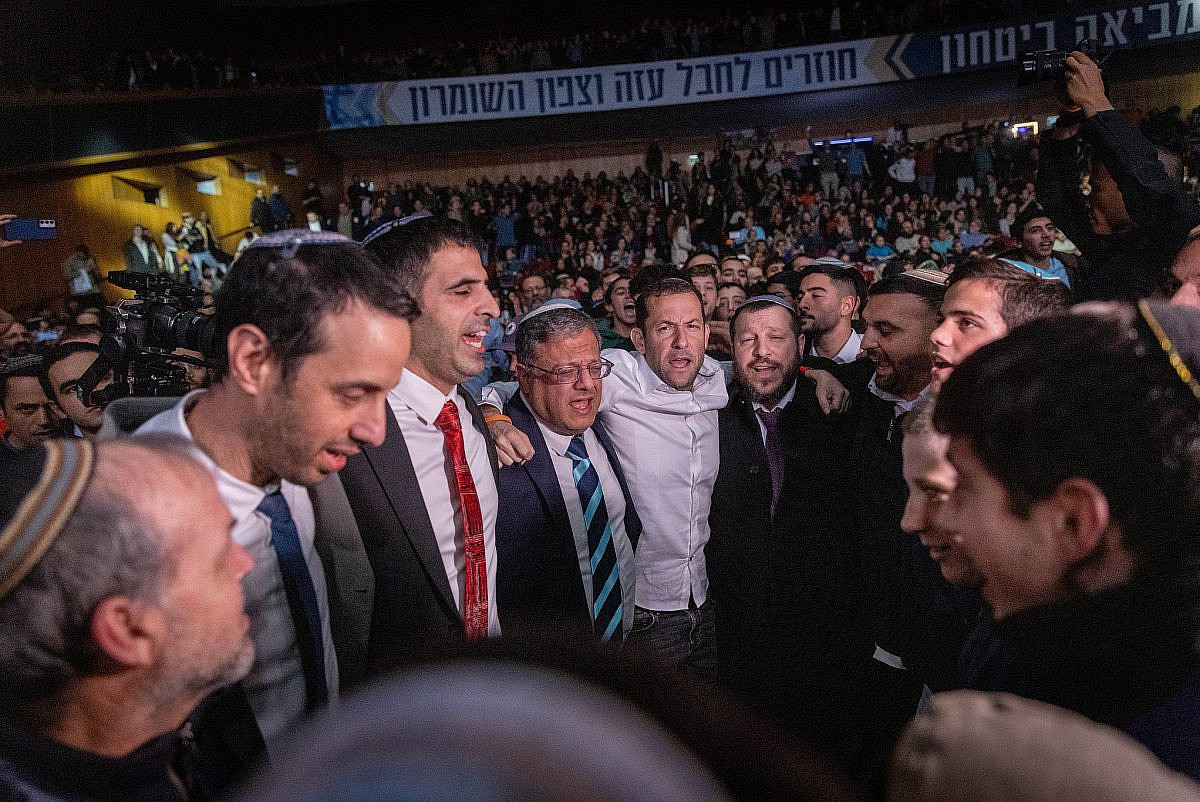Earlier this month, Yinon Magal, an Israeli journalist and former Knesset member for the HaBayit HaYehudi (Jewish Home) party, posted on his social media a photo of himself with Boaz Bismuth, a current Likud lawmaker and former editor-in-chief of the right-wing daily Israel Hayom, showing the two working out in a public park. Magal is visibly jubilant, wearing a shirt that reads “Total Victory,” and Bismuth is beaming next to him. “Preparing for the Oct. 27, 2026 elections,” reads the caption.
It seems, as far as Magal and Bismuth are concerned, that a victory over Hamas in Gaza and a future electoral victory for the Israeli right are one and the same. A day earlier, more than 100 Palestinians had been killed, most of them shot by nearby Israeli soldiers, while scrambling for scarce food supplies on aid trucks, and three Israeli soldiers had been killed in Khan Younis — but according to these right-wing politicians, the situation has never been better.
The elation that this picture conveys is not unusual. In fact, since October 7, elements of the Israeli right have been exuding an excitement that borders on outright euphoria. The most prominent example, of course, is the dance party that took place during the Gaza resettlement conference in January, which was attended by 11 cabinet ministers, 15 other members of the governing coalition, and thousands of enthusiastic participants. Finance Minister Bezalel Smotrich claimed that the accusations that they danced while soldiers’ blood was spilled in Gaza are “outrageous.” Yet it’s hard to deny that many on the right see everything that has happened since October 7 through the lens of biblical redemption.
“A holy nation, the virtue of nations, the lion cub of Judah, awakened from his long slumber to claim his inheritance.” This is how Rabbi Uzi Sharbaf — who was sentenced to life in prison for his involvement in the 1983 murder of three Palestinian students at the Islamic College in Hebron, and was released seven years later — described the current moment at the settlement conference.
Sharbaf’s words echoed statements by Amichai Friedman, the chief rabbi of the IDF’s Nahal Brigade base. In a video from early November, Friedman proclaimed that the month since the October 7 massacre had been “the happiest month of my life since I was born. The people of Israel rise in stature, rise in rank, we finally find out who we are … We are telling the world what good, and justice, and morality, and values are, and therefore we will shut down evil, and eradicate Hamas, and eradicate the enemies, and destroy everyone.”

Rabbi Eli Sadan, head of the Bnei David pre-military academy in the West Bank settlement of Eli, was quoted as saying that “this period will be recorded in the history of the Israeli nation as a wonderful period. A time when the power of unity overcame all divisions … A time when the sense of identity and essence of our people is bursting forth and being revealed in all its glory.” For this period to be truly miraculous, Sadan warned, it must end with “no place to which those who for decades have nurtured and fanned the flames of hatred for our people can return … There will be no more Gazans in Gaza.”
And of course there’s Magal himself, one of Israel’s most prominent right-wing journalists, who said in an interview with Roni Cuban on Kan 11, that since October 7, Israel has been in an “amazing period … A period that does good for the people of Israel, that connects us to our identity, to our essence … It’s an amazing time in the sense that after decades of living in La La Land, people are sobering up.” Suddenly, these right-wing voices insist, there is great “unity among the people of Israel.”
‘Catastrophe as opportunity’
To be sure, the right has never really been in favor of unity. Rather, it expects the Israeli public to ultimately adopt, or at least acquiesce to, its positions. One may also harbor doubts about how real the current “unity” is, but there is no question that the mantra of “together we will win” has had enormous implications for political discourse in Israel.
Indeed, it has stifled virtually all criticism of how the war is being conducted or the legitimacy of its goals. It has also instilled the dogma that only military pressure can lead to the release of Israeli hostages — a claim with no factual basis, since military force has led to the release of only three hostages during more than five months of fighting, while a political deal with Hamas resulted in the release of more than 70 hostages in late November. Israeli military operations, meanwhile, have resulted in the deaths of at least ten hostages, and possibly many more.
The groundwork for this worldview had been built well before October 7. According to Dr. Avi-Ram Tzoreff, an author and a research fellow at the Van Leer Institute in Jerusalem, the Israeli right has long “bestowed sanctity upon militarism,” perceiving military power as almost religiously “redemptive.” Thus, the national consensus that the war in Gaza must end with the “elimination of Hamas,” and that such a war could last for months or even years, is seen by the right as a clear victory for its long-term political agenda.

The ostensible unity created on the battlefield in Gaza has greatly diluted the wave of anti-government demonstrations that swept Israel since the start of 2023. The fact that the Kaplan Street protests in Tel Aviv are now struggling to bring masses to the streets — despite widespread furor at Prime Minister Benjamin Netanyahu — is partly indicative of the power of the government’s sloganeering. The Kaplan protests posed the greatest threat to the right’s hegemony in 20 years; “together we will win” has been the government’s lifeline.
The feeling of “disillusionment” has also played well for the right. This disillusionment post-October 7 massacre has less to do with losing faith in a political process vis-à-vis the Palestinians — which was not on the agenda anyway — but rather with shedding any notion of Palestinians in Gaza, and perhaps Palestinians in general, as human beings. The disturbing claim that “there are no innocents” in Gaza is certainly promoted by prominent right wingers like journalist Zvi Yehezkeli, but is hardly exclusive to them. Indeed, dehumanization is seen as a justified and even reasonable response to the October 7 massacres, and to the belief that Hamas still enjoys considerable support or legitimacy among Palestinians.
This utter moral indifference to Palestinian suffering was reflected in the Israeli response to the killings of more than 100 Palestinians during the distribution of humanitarian aid in Gaza on Feb. 29. During the 1982 Lebanon invasion, hundreds of thousands of Israelis took to the streets to protest the Sabra and Shatila massacre, perpetrated by Phalangist militias but wittingly facilitated by the Israeli army. This time, the IDF Spokesperson and the Israeli media unabashedly blamed the Palestinians starving in Gaza for their own deaths — despite evidence that Israeli soldiers shot them, and that the starvation itself is the direct result of the Israeli siege and bombardment.
The right is exploiting this disillusionment to advance its plan of “resolving the conflict” by expelling most or all of the Palestinians from Gaza, and later from the West Bank. In the right’s eyes, as Tzoreff says, “the most moral goal is [population] transfer.”
This sentiment was evident at that settlement conference in Jerusalem, which prominently featured the slogan “only transfer will bring peace.” Encouraging “voluntary immigration” is “the moral solution to the Gaza Strip,” wrote Yoav Sorek, a right-wing intellectual, who has even shed his kippah in an attempt to appeal to the secular public and create an “Israeli alliance.” The fact that a centrist politician like MK Ram Ben-Barak of Yesh Atid expressed support for “voluntary immigration” is further cause for celebration among the right.

When questioned about the clear majority that Palestinian constitute both in the West Bank specifically, and between the Jordan River and the Mediterranean Sea more broadly, many settler leaders often invoke the biblical prophecy of Gog and Magog — implying an apocalyptic war which will not necessarily be initiated by Israel, but which will finally determine the demographic problem and Jewish future in the land.
Tzoreff highlights that the view of “catastrophe as an opportunity is a Zionist tradition.” He quotes David Ben-Gurion, Israel’s first prime minister and a secular Zionist, who said in 1942 that the Holocaust was “a disaster of millions [but] also a redemptive force of millions. And the mission of Zionism … is to imbue the great Jewish catastrophe with great patterns of redemption.” Similarly, Rabbi David Sabato, who teaches at the Ma’ale Adumim Yeshiva (in a West Bank settlement), explained how the Six-Day War of June 1967 was perceived by religious eyes as “a mythical event … of biblical magnitude.”
It seems the war of October 7 is now being seen in the same way by the Israeli right: divine intervention realizing the vision of a Greater Israel, free of Palestinians. This may explain why Rabbi Amichai Friedman, of the Nahal Brigade, was able to describe the weeks after more than 1,200 Israelis were killed as the happiest month of his life. A few victims will not overshadow this historic, miraculous moment.
Collective despondency
Yet for all the Israeli right’s successes these last few months, it has failed miserably in one key respect: to sweep the Jewish-Israeli public into the same sense of messianic euphoria.
Indeed, the mood of the vast majority of the Jewish public ranges from deep depression to prolonged despondency. It is true that most Israelis have returned to their normal routines, but the sense of distress hasn’t left them. In the polls, the National Unity party leader Benny Gantz and Yesh Atid head Yair Lapid are projected to win a combined total of more than 50 out of 120 seats in a future election; neither of them express anything close to the right wing’s euphoria.

The collective despondency derives from various factors, including the lingering trauma of October 7, the soldiers who continue to be killed in Gaza, the hundreds of thousands of Israelis evacuated from the southern and northern regions, the precarious economic situation, and the hostages still held in captivity.
However, it also reflects a deep understanding among significant portions of the Jewish public of several things: that the war in Gaza is not going anywhere; that the total defeat of Hamas is not a realistic goal; that the belief that military force will release the hostages is hollow; and that mass population transfer of Palestinians is not possible, both because Palestinians will refuse to leave and because no one wants to take them in.
Few in the Jewish-Israelis public are daring to put these subconscious realizations into words. Public admission of the war’s futility, they fear, may undermine the fragile mental balance that many Jews built for themselves after October 7 — the illusion that, through military might, they are regaining control of their destiny after that dark day in October.
Most read on +972
In this sense, the emotional barrier built in the face of the humanitarian catastrophe in Gaza enables Israelis to maintain their ambivalence about the war. If they recognize that flesh-and-blood people live in Gaza, they will have to publicly acknowledge the failure and cruelty of their destructive operation.
All this could mean that the Israeli right’s euphoria will be temporary. If a ceasefire agreement is reached in the coming weeks, it could be the first stage toward the end of the entire war, including a hostage-prisoner exchange, the return of Palestinians to the northern Strip, the army’s gradual withdrawal, and perhaps the beginnings of regional and international political change around the conflict. In other words, instead of overseeing the elimination of the Palestinian cause, the right may see Israel go in the opposite direction — with the disillusionment afflicting the dreams of the right itself.
A version of this article was first published in Hebrew on Local Call. Read it here.






